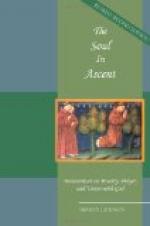A little light on this subject comes from the faith of the world’s greatest teachers. As there are, now and then, those who see farther than others with the physical eye, so there have been a few teachers who have been rightly called seers, because their eyes have penetrated farther into the mysteries of the universe than have those of their fellow-men. Among the seers of the ages, I think that the two whom all would recognize as being preeminent are Socrates and Jesus—the one the finest flower of the intellectual development of Greece, and the other the consummation of the hopes and visions of the most spiritual people that the world has ever known. Both Socrates and Jesus believed in God, and both have taught the world, with no uncertain sound, of their faith in immortal life. The latter was clearly an axiom with Jesus, for He said to His disciples in effect, “If there had been any question about it I would have told you;” and almost with his last breath Socrates compelled his disciples to think of him as immortal, for he told them that, though his body might be buried anywhere, he defied both friend and foe to catch his soul. Socrates and Jesus represent the belief of the world’s greatest seers.
The deep and abiding confidence of the teachers, who increasingly command our admiration as the years go by, is not to be entirely disregarded. We may care little what those tell us who walk by our sides in the dark valleys or on the dusty plains; but there are others who have climbed to the crests of the loftiest mountains, and who have looked into a world of which we have only dreamed. When they come down we listen because we know that they have had visions. Even so it is in our intellectual life. A few men have risen above the common levels of humanity, as the Alps above the plains of Lombardy. They have spoken concerning what they have seen. They have had glimpses of God—the soul of the universe, and of the persistence of individuals in the realm that lies beyond the grave. I might not let my faith be determined by their testimony alone, but when what they say is confirmed by many other voices speaking in the soul, and sounding through the history of the world, it is easy to believe that they have spoken of things which have been revealed to them.




